Batman: Arkham City begins, as did Batman: Arkham Asylum, with a new high-profile inmate escorted into the titular facility. It’s obvious that the setting was determined by gameplay considerations; Rocksteady wanted a more extensive environment, but they didn’t feel Batman would be best served by an open world game. Arkham City is a compromise: it is larger and more varied than the asylum but it is still a closed setting mostly populated by criminals and lunatics, with the occasional unfortunate civilian thrown in. The good thing with this decision is that it gives the player several city blocks’ worth of freely navigable game world and plenty of thugs to beat up. The bad thing is that it makes no sense.
The premise of the game is that Quincy Sharp has been elected mayor of Gotham City on the strength of his stellar career as the warden of Arkham Asylum, which culminated in a massive breakout that left dozens dead, and has used his influence to construct a new penitentiary for Gotham. Several city blocks, containing some iconic locations, have been acquired through eminent domain and walled off from the rest of the city. Prisoners from Blackgate Prison and inmates from Arkham Asylum have been thrown in and left to fend for themselves. The walls are protected by automated sentry guns and armed guards. The entire project is overseen by an unknown psychiatrist with a shady past who uses his private security forces to kidnap people, including doctors, prominent journalists and the occasional billionaire philanthropist with an army of lawyers, and throw them into Arkham City with neither arrest nor trial.
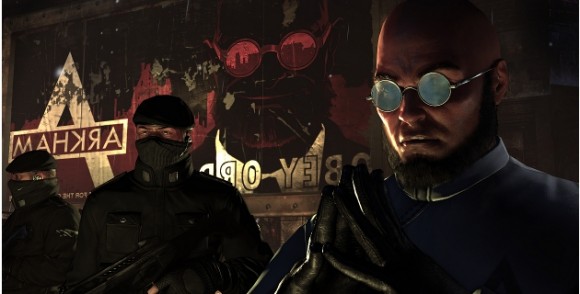
You might protest that a game based on a comic book property doesn’t need to make much sense; that it’s not any worse than, say, the U.S. Government abandoning Gotham to its own devices in the No Man’s Land story arc, which may indeed have been an inspiration for the game’s setting. I say: bollocks. The game needs to stand on its own, and the fact that Rocksteady have chosen a premise I can’t buy for one second is a legitimate problem with the game. The story that follows doesn’t make a whole lot of sense either. If you are one of those strange people who claim to play games for the stories, you might find this cuts into your enjoyment.
In Arkham Asylum the Joker was clearly the main villain of the piece and the entire story revolved around his plan. Whether that plan made sense or not was irrelevant since, well, he’s the Joker. In Arkham City the master plan Batman is attempting to thwart is Strange’s but, as far as emotional impact is concerned, the main villain is still the Joker. The fact that Mr. Strange has managed to come up with a plan less credible than the Joker’s is also a problem as, though he is certainly unhinged, he is not presented as a raving lunatic. Also, since for most of the game you don’t know what that plan is, it carries very little emotional weight and is easy to lose sight of when dealing with more immediate concerns involving secondary villains.
There are also four Catwoman missions thrown into the mix, which follow a different thread and so don’t exactly help the overall coherence. The spacing of Catwoman missions is also a little odd: there’s one as an intro before the story proper and one soon afterwards, and then she isn’t seen again until near the end of the story.
It is obvious that the plot is a mere contrivance to take you through the city and the various set pieces. This is, in my mind, the proper function of a video game story, but I have seen it executed better. As usual, the problem comes from the developer believing they are doing something grander without actually achieving it. That, and a boring ten minute end credits sequence points towards this being a game that takes itself far too seriously.
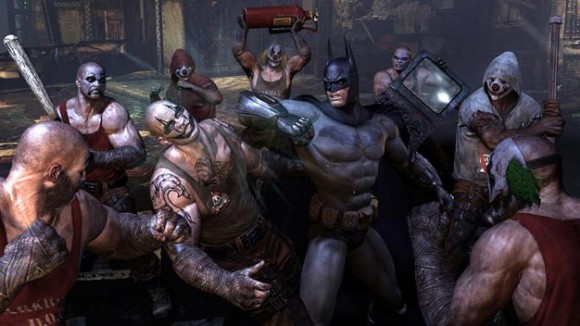
The trick to enjoying the game is to ignore the premise and the plot as much as you can, and focus on being Batman. That is, after all, the main selling point of the game, and this aspect works very well. Your scope of activities is pretty much the same as in Asylum, but this time around you have a few new moves and gadgets at your disposal–though they are unlikely to blow your mind–and of course the game world is bigger. To help you navigate the map you have some new glide moves.
When I first heard of Rocksteady’s new glide mechanics I was afraid they’d make the controls too complicated and annoying. Luckily, my fears proved unfounded. The glide mechanics are easy enough to learn and very fun. Once you get the hang of it, you can cross the map in two minutes without ever touching the ground. I’m not sure if that’s actually faster than getting from place to place in Asylum, but with no loading breaks or walking through interminable corridors it sure feels like it.
The combat moves also remain manageable and the use of gadgets in combat works nicely, even with a larger selection. There are some nice new moves: grabbing a baseball bat and breaking it on your knee, or catching thugs rushing at your back with a double Batman backhand are very appropriate additions. The combat has been polished to be a little smoother overall and it’s possible to pull off some last-second counters that wouldn’t have worked in Asylum. The brutal ballet of Freeflow combat, then, remains just as enjoyable as it was in Asylum. There are many more big fights in City than there were in Asylum, which shows Rocksteady have a decent grasp on the strengths of their game.
The story missions see you beating up thugs, defeating locking mechanisms, investigating crime scenes, searching for things with the aid of various sensors, playing hide-and-seek with men with guns, and the occasional gimmick boss fight. I’m not generally a fan of gimmick boss fights, but they are more varied in City than in Asylum, and arguably the mechanic of identifying a weakness and then exploiting it is a good fit for the World’s Greatest Detective. I must confess that I found the fight with Mr. Freeze in particular pretty cool.
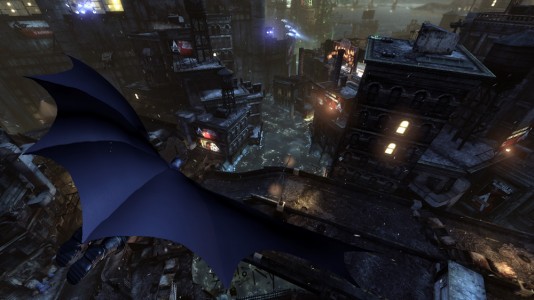
Deep in the gamer unconscious is a pervasive need to gather collectibles, and a large part of your game time will probably be spent collecting Riddler trophies. There’s a lot more of them in City than in Asylum and many of them require the correct application of gadgets or acrobatics to get at. I admit it is somewhat satisfying to figure out the trickier of these puzzles, and there’s an in-story motivation in the form of Riddler’s hostages, but there is still something incongruous about Batman leaping from one pressure plate to another in sequence or throwing Batarangs around corners to get at green question marks while evil is afoot. I’m not sure it materially adds to players’ awareness of the “extreme pressure of the challenges that they face” the developers claim they were shooting for.
Near the end of the story when Strange’s master plan goes into effect side missions and other distractions are left behind, plot takes over for the endgame, and things get epic… for about a minute. The nefarious goings-on form a backdrop against which Batman, well, beats up thugs, defeats locking mechanisms, and plays hide and seek with guys with guns.
Once you finish the main plot you can continue to collect Riddler trophies and finish side missions and, unlike Asylum, City makes sure you never run out of thugs to beat up, though by that same token you encounter the same groups of thugs in the same locations over and over again. New Game Plus and various challenges also give you more to do. I haven’t really spent a lot of time on the challenges yet, but I noticed that it’s really easy to get full marks for the combat challenges. I also noticed that some of the new moves can lead to absurdly high score multipliers when used skilfully, so I expect the tops of the leaderboards to look quite scary very soon.
Like its predecessor, Arkham City is not a particularly difficult game. Sure, you’ll lose a fight every now and then when you get thrown off your rhythm, or get gunned down because you became impatient, and there may be boss fights you a need a few tries with, but you will conquer the game without undue difficulty. Generally I don’t like this aspect of modern games but I don’t think it’s a terrible problem for Arkham City. This is, after all, a game that lets you be Batman. The challenge isn’t so much in overcoming your foes, but in overcoming your foes like Batman. That means not scraping through a fight like a spasmodic idiot with a strong jaw, but defeating thirty guys in one smoothly flowing series of perfectly executed strikes and throws without ever getting hit or missing a beat. It means taking down a roomful of criminals with assault rifles without being seen or heard while scaring the crap out of them. This is where the heart of the game is found. Never mind the dodgy story or the unnecessarily grimdark setting. Never mind that Arkham City doesn’t really add anything groundbreaking to the franchise. What makes this a successful superhero game is the feeling you get when playing it right. That feeling that makes you say: “I’m Batman.â€

Na Na Na Na Na Na Na N-Piss Off
Hands up who loved Arkham Asylum?
I’ve got my hand up, honest, I have. It was a solid, enjoyable romp that bucked the superhero game trend by actually being worthwhile, and moments like the Scarecrow sections made it unpredictable and exciting from start to finish. I actually sold and later re-bought Arkham Asylum, so much did I enjoy it.
As a result I couldn’t wait for Arkham City. In reflection I wonder whether this set my expectations too high and whether this is why I bloody hate the stupid pissing game.
First off, I should level with you: I’m not a Batman fan. I’m not a comic book fan, I’m not a superhero fan, and I’m not a superhero comic book fan. However, this didn’t stop me from enjoying Arkham Asylum; I know who the Joker is, and I understand that he is naughty and that Batman needs to biff, kapow and zonk him back to wherever he came. That was enough for Arkham Asylum.
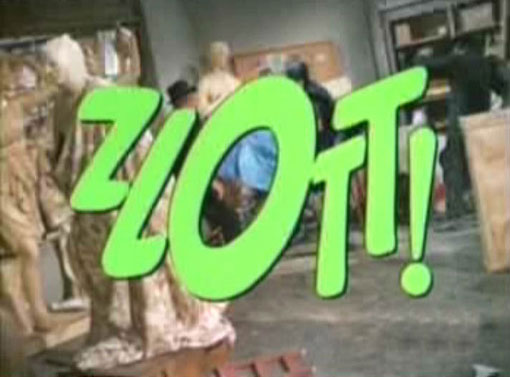
Arkham City, on the other hand, is like playing something that’s being narrated by a child with ADHD, a list of Batman villains and an industrial sized bucket of sherbert. Characters are introduced and motivations switched so often it’s hard to keep track of who’s on your side and who isn’t, and characters who have attempted to brutally murder the Bat every time they have previously met him suddenly decide that actually, working together really is the best option this time around. Also, as someone who doesn’t really “get” Batman you can only be introduced to so many villains who are after Bruce Wayne for some long, drawn-out reason involving their parents that you kind of think “You know what? It gets to a point where so many people don’t like you, Bruce, that you have to accept that you’re just not very likeable.”
The game tries to squeeze way too much in for fear of not appealing to hardcore fans, and as such I think it alienates the non-committed. It’s hard to concentrate on the story when every few minutes the game is going “LOOK! It’s some obscure villain from the Batman universe over there! LOOK! QUICKLY! He wants you to jump through some arbitrary hoops, or… nyah, it’s the fucking MAD HATTER! LOOK! PLEASE!” It should have been called Fanservice City, the way it pisses on about them.
Of course, the game keeps schtum about the fact that some of these side-missions become completely inaccessible once you complete story mode, so I suppose I should give it some credit in the “keeping you focused on the job at hand” stakes, the duplicitous little shit. This didn’t actually help me follow the story, however: Wayne has ended up in the world’s most unbelievable penal colony (other than, y’know, Australia) because of… something, and as a result has to find a cure for the Joker… or something. It’s hard to keep up because the game insists on playing antagonist Bingo with you.
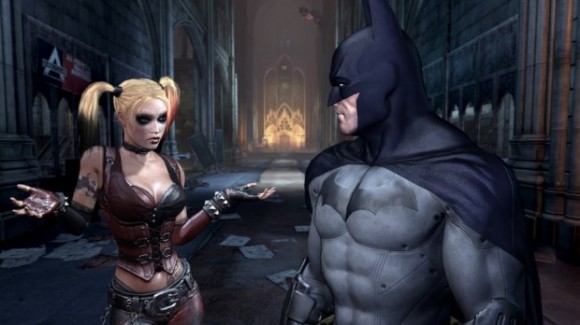
I also found the voice acting laughable at times; Batman can’t say anything without it being in a cold, lifeless monotone like someone dragging a slab of granite across marble, and after a while I found myself considering whether the sound of my stomach digesting food was more interesting than the bollocks the people on my telly were grumping at each other. About an hour or two after that I decided that it was, if only for the fact that it had more of a dynamic range than every single character in the game.I understand Batman is supposed to be all dark and brooding and shit, but when you consider how ridiculously campy some of the names of the people involved in the story are it’s hard not to just laugh at it. The way Batman continuously calls Penguin “Coh-Bul-Pawt” never ceased to make me smirk. It’s as if somebody tried to remake Hard Candy in the fucking Teletubbies universe.
As a geek I also feel I should comment on some of the ridiculous technology featured in the game. Robots found in a long-abandoned tourist attraction that record what they see on tape which is then wirelessly transferred to a shared memory bank that’s only accessible by downloading from all the units in a specific area, for example, is just complete fucking clownshoes. I also found myself baulking at Batman’s discovery that helicopters have a port on the bottom that allows someone hanging on to the skids to (again, wirelessly – Bluetooth, I assume) download missile launch codes from. I know Batman’s daft in that respect, but this just felt like it was testing my ability to swallow any old shit. (Which is substantial; I’ve watched the Takara series’ of Transformers.)
Level design is, at best, obstructive: the game decides when and from where you’re allowed to swing, and if you’re not thinking about the same piece of scenery as it is when you leap off a building, good luck trying to actually travel in the direction you want to. Also, remember those excellent Scarecrow hallucinations that I mentioned before? The ones that everyone enjoyed so much in the first game? Yeah, there’s none of them; in their place is a single “mind fuck” section in which you glide across a few platforms then fight a man who I still can’t remember whether or not you liked because you need his blood or something.
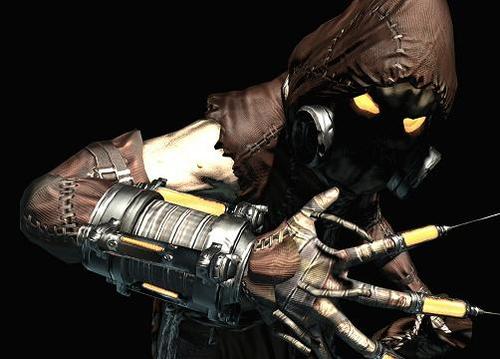
I was racing through Arkham City so I could trade it in for Skyrim, and towards the end of it I made a terrible realisation: I was playing it just so I could say I’d finished the fucking thing. I wasn’t enjoying it. I couldn’t have given two soggy shits about the story, and I was getting pissed off at the game’s sudden switch in enemy tactics that meant that my decision not to take one of the suit upgrades made a final section of the game tremendously difficult without offering any real benefit elsewhere. I was just following the objective marker, doing what it instructed and then trudging on: It was like some sort of demented version of Milgram’s Authority Tests. (Yeah, I did A-Level Psychology. Get over it.)
In short, Arkham City tries to scale Arkham Asylum out into something far bigger, and fails on just about every single level. I picked up Skyrim the other day, and found that a single side mission contained better story, character and plotting than Rocksteady’s over-egged, over-ambitious and under-delivering hock of Bat-flavoured phlegm.
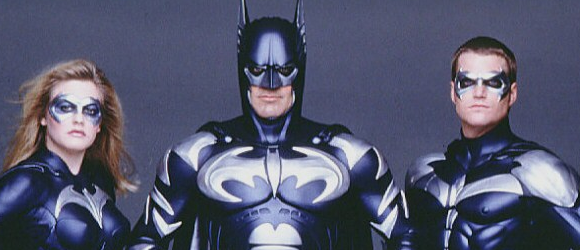

Comments
19 responses to “Incoherence versus the Bat: two takes on Arkham City”
I'm a miserable, bile filled little fucker aren't I?
Unsurprisingly, I loved it.
The plot is clearly bonkers, but we are dealing with comic book superheroes and villains.
I felt Prof. Strange was wasted a little, becoming nothing more than a pawn in a larger game in the end. Isn't he meant to be incredibly clever?
I do think that Strange's ability to throw people into Arkham City "with neither arrest nor trial." was because of his puppet-master's influence. (His whole modus operandi is infiltrating every rung of society, from law enforcement to government)
Maybe that's just me trying to rationalise a gaping plot hole.
As a video game I think it follows the Metal Gear Solid formula, which can only be a good thing. Side note: MGS is equally bonkers.
The ending was very odd, and the last minute twist was surprising.
I've just finished all the Riddler Challenges and started working through the Challenge Rooms. With just 73% completion, the game offers a lot of play beyond the main story – if nothing else.
Hey Mark,
(POSSIBLE SPOILERS)
As you said to me the other day, the Mr Freeze fight did feel like it was straight out of MGS, and was actually quite enjoyable – however, the motivation for the battle was very poorly done, in my opinion.
Again, this could be simply because I'm not a massive Batfan, but Freeze seemed to get very angry very quickly for no logical reason.
(END POSSIBLE SPOILERS)
Arkham Asylum felt like Metroid, which is ace. This felt like an obstacle course with some extremely average third person action sellotaped onto it.
SPOILER WARNING
We are talking about a supervillain Batman had earlier pressured into giving up his secrets and doing work for him through enhanced interrogation techniques. How rational do you want him to be? Yeah, cooperating would have been a better option, but if he consistently made good decisions he wouldn't be stuck in a life-support exo-suit rampaging around freezing people.
END SPOILERS
Arkham Asylum was just as much an obstacle course as Arkham City, and the third person action, their core gameplay, is almost identical in both, so I really don't understand where you are coming from here. Asylum was a tighter package, though.
Yeah, given how Strange was set up as a mastermind it's odd how useless he turned out to be.
I think that you are rationalizing. Strange was straight up kidnapping people off the street and apparently was looney tunes enough to think he could get away with it. And not only get away but leverage his success into establishing more concentration camps. Yeah. Right.
It's a fun game, as long as you don't pay too much attention to the big picture.
It depends how deep you want to go (That's what she said) because if you complete the Riddler Challenges you get rewarded with interview tapes which fill in some of the finer details.
But I understand that only the minority will actually care enough to do that.
I think, in the end, they just tried to cram too much story in there and ended up just paying lip service to some villains
I unlocked the tapes, but listening to them? I bought a fucking game, not a lame audio book. At least in Asylum you could (usually) listen to the tapes in the background while doing something else, but in City every time I tried to exit the menu the tape would stop playing. So there I was, spending minutes on end with the controller laid aside staring at a menu and listening to Strange's Radio Theatre. Let's not do that in the next one, please.
This article feels likes like 2 dapper gentlemen trying a new roller coaster and then complaining about the ride having a stupid back story and a laughable color.
http://jimfairthorne.files.wordpress.com/2010/11/…
Statler:
In short, Arkham City tries to scale Arkham Asylum out into something far bigger, and fails on just about every single level.
Waldorf:
I picked up Skyrim the other day, and found that a single side mission contained better story, character and plotting than Rocksteady’s over-egged, over-ambitious and under-delivering hock of Bat-flavoured phlegm.
Statler:
I say: bollocks.
*Waldorf and Statler laugh, bobbing their heads up and down, looking at each other than back at the camera.*
What about Pirates of the Carribean, that is a ride with a backstory, that then went on to spawn a ton of films.
Incidentally, I don't like Rollercoaster rides
I think this was meant to be a reply to me? If so, damn, you zinged my zing good!
I've not been aware of a rollercoaster with a backstory since I bought the Nemesis comic in 1994!
I've gotta be honest, I disagree. Bulletstorm was more of a rollercoaster than this, and whilst that didn't have a story that set the world alight, at least it made some fucking sense.
Then it's just an unexpected added bonus. My point is not that's it's impossible to make an action packed game with a good story, but mainly that when making a game like BAC, it's understandable that most of the development energy isn't spent on logical and compelling story writing. I don't think the game or its marketing campaign tried to convince anyone that it was the case.
Expecting the story of a game like this to be anything more than an excuse for the action and gameplay is kinda naive and this feels like a poor attempt to snob a game that got good reviews.
I don't care much for this game, but this feels to much like circlejerking not to point it out.
I don't expect a video game story to be anything but a device to tie the action together and give it meaning. Alas, Arkham City doesn't do a very good job on either count.
If you feel it is uncalled for to criticize a big budget AAA title in 2011 for failing to manage a story that doesn't make you want to actively ignore it, I can't agree with you.
I feel like I have thoroughly failed at communicating if that was the feeling you were left with. Or alternatively, like you only read my piece halfway through.
http://www.youtube.com/watch?v=PgH8Et_m87o
I had forgotten about that scene.
On a different course, these harsh words seem to have gone a little far. As much as I like to accuse people of circle jerking, there seems to be some validity to the criticism. For starters they have a genuine comic book writer working on their team helping with the story. It isn't some random developer with writer aspirations:
http://en.wikipedia.org/wiki/Paul_Dini
To expect better from him is legitimate.
Do I agree that the plot sucks, can't say as I haven't played it.
That two people, independantly (sorry oddvorbis, this article was originally just Spann being a curmudgeon and randomly Walker also wrote a piece) decided that the story line was incoherent, and worse distracted them enough from the game play to bring it into question. Well I think Ben Kingsley's character in Lucky Number Slevin said it best (I am paraphrasing).
"If some one calls you a donkey then tell them to get lost. If they call you a donkey again then you are within good reason to punch him. If they call you a donkey again, well then maybe you should start looking for a saddle"
Not to say that there aren't a lot of people who think that Batman: Arkham City is fantastic but there are certainly other detractors out there, from the Hulk guy who found it overtly sexist to, well, Arcadian Rhythms (have to be off, my battery is running out, and I can't find more examples). I think it is fair to poop on that which you don't care for.
Also:
http://www.youtube.com/watch?v=Ab1CWQkEc0Y
I just want to second what AJ says above – Juho and Spann didn't even see one another's reviews until after I'd edited them into the same post. There is no circlejerking, just a coincidental confluence of opinions. It's also worth noting that, actually, one of our reviewers liked the game, which is different from not liking it by a considerable margin. :)
There is an interesting if well-worn discussion to be had about whether a videogame plot should be simply a framing narrative for a sequence of actions (Puzzle Quest), a compelling story rich with character and theme (Pathologic), something in between (STALKER: Call of Pripyat) or something else entirely (e.g. non-existent, like Geometry Wars). I think that within the pool of AR writers we have a diverse spread of opinions on the subject, and I also think that the fact that we regularly see games with stories of all stripes proves the point that, actually, a lot of people do care about story in their games.
AR is a site which often presents unusual opinions but this is never forced and definitely not a circlejerk. There is no editorial policy of courting controversy or pursuing iconoclasm. There is just a bunch of people with their own opinions, who regularly disagree with one another.
We welcome disagreement with us – we relish it in fact, we love a good discussion – but it is better to engage with the criticisms you disagree with, or to present the positives that you feel overwhelm or negate any negatives, than it is to accuse anyone of circlejerking or to try and undercut their opinions by stating that they are being kinda naive.
I am happy that Arcadian Rhythms comment threads remain mostly free of the echo chamber affect, and long may it be so! That is as close to an editorial standpoint as you will find from me. :)